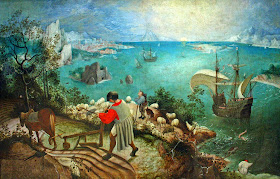I hadn't seen Bernard since the elections. When I'd asked him to meet me at DZ's, he'd said, "I'm not sure I can find it." Surprised, I said, "But we meet there all the time. You know the way." "I don't know," he said. "How are you supposed to navigate your way around a country you don't recognize?"
After Bernard had ordered his chicken noodle with matzo ball and I'd ordered my reuben, Bernard shook his head.
"What is it with Americans? We haven't completely crawled out of the wreckage and already we're voting again for Republicans?"
"Americans love their Republicans."
"Americans do nothing but mock them!"
"Well, in the media you ingest, sure. But America's natural state is under Republican rule."
"How can you say that? Look at all the Democratic presidents we've voted for."
"Really," I asked. "Who have we voted for lately? In the half quarter century or so?"
"Carter. Clinton. Obama."
"That's it! And look what it took for them to get into office!"
Bernard looked at me warily.
"This country doesn't like Democrats. Carter only won election because of Watergate, the worst political scandal of the last half century. Clinton was the most brilliant politician of a generation and even he only won because Perot introduced a real third party. And Obama came into office after the worst financial crisis of a century. We don't elect Democratic presidents unless Republicans have found themselves in a spectacular mess."

"We had a really long run of Democrats before that. Look at how long FDR served."
"Sure. It only took the Great Depression and the bloodiest war in the history of the world to elect and then keep him in office."
"You're no fun," Bernard pouted. "But still, those Republicans worry me. They're all religious fundamentalists."
"That's not really true," I said. "There are a lot of Republicans who aren't social conservatives. They're more libertarian."
"What? I'm 12? I don't know this? I know that party has lots of libertarians. They're the worst kind of religious fundamentalists."
I raised an eyebrow over top of my sandwich, opting to take a bite rather than actually say, "What?"
"They don't even know theirs is a religious belief. They don't believe in the invisible hand of God. They believe in the invisible hand of the market," Bernard continued. "It's just a different kind of religious fundamentalism. Each are waiting for intervention from some outside force but in the end it's just people who do or don't do things. You might be induced by religious prophets or financial profits but in the end you can choose to do the right thing regardless. People can collectively decide to do the right thing without blaming religion or markets, showing blind trust in a benevolent God or in self-interest."
"How's that?"
"With policy. With culture. Not everything has to be inspired by belief in invisible forces."
"But the libertarian philosophy isn't incoherent. It makes sense that people could be free to do what they want without regulations and simply let supply and demand define what does and doesn't happen. I may not be enamored of it but it's not indefensible."
"No," Bernard said. "It's not incoherent. It's just naive. Libertarians' history usually starts back only a few decades, back to the 1980s. They don't realize that the 'ideal' state they've described is actually the conditions we began with centuries ago."
"Huampha?" I responded, my mouth full of sauerkraut and turkey.
"You should order soup," Bernard said. "It's healthier and it's more civilized. It allows a real conversation instead of these awful monologues you force me into once your sandwich has come."
"Mmmmp," I acknowledged, trying to quickly swallow. Bernard just shook his head.
"We started out with chaos, just like in Genesis. And then strong men arose to protect us from other strong men but of course the strong man demanded his tribute. He kept us safe so he got all the best, from land and food to the women and gold. Over time, laws got set up that let smart but obnoxious people like Steve Jobs and Mark Cuban become rich. They didn't have to cower before the big man because now the state protected them. And now they've forgotten these origins, wanting to shrink the state down as if the strongman wouldn't come back in a heartbeat to take their prizes."
"Well, in their defense they do advise that a state have things like defense and police. They just think that markets should define things. Community defined by supply and demand."
"And in that, too, they're naive. One, people who increasingly felt left out of prosperity aren't going to support the protection of private property. Everyone has to feel invested in the system and the raw workings of the market don't do that, don't automatically confer success on everyone. Markets leave some people unemployed and even more people poor. We're about to hit an unprecedented point in history in which the top 0.1% have as much as the bottom 90%! When have you ever made a "bottom" out of a full 90% of people? Why would poor people support a system that ignores them? And worse, these libertarians don't even listen to their own words. 'Supply and demand?' They think that there isn't a demand for a welfare state? It's been voted in - in one form or another - in every economically advanced nation. It's one of the most timeless products out there. If you're going to embrace supply and demand, you're going to embrace a welfare state that mitigates the effects of unregulated markets."
It was silent for awhile. I couldn't argue. I had a sandwich to finish.
After awhile, I asked, "So, who are you pulling for in 2016?"
"Rand Paul," Bernard said as he took a sip of his soup.
"What?"
"Well, as fantasy novelists go, I prefer JK Rowling to Ayn Rand, but if there's no Rowling to promise a world that previously existed only in fiction, I guess I'll go with Rand." And then he laughed at his own joke.





























